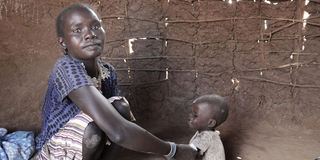Pokot elders appeal to Ruto on Kerio Valley development projects

A mother with her child at Chesegon area, Kerio Valley.
Pokot elders have appealed to the Kenya Kwanza government to establish the root cause of insecurity in the Kerio Valley region and consider rolling out development projects as a permanent solution to the problem.
It follows protracted attacks and cattle rustling on the borders of West Pokot, Turkana and Elgeyo Marakwet counties.
The Marakwet, Pokot and Turkana have engaged in recurrent armed raids for a long time, undermining the livelihoods of residents.
Multibillion-shilling projects started by non-state agencies that offered an economic lifeline to Kerio Valley locals have collapsed over the years and remain deserted due to banditry.
Accusing former administrations of failing to identify the root cause of insecurity in the region, the Pokot Council of Elders blamed high illiteracy levels and unemployment that result in poor development.
“Many youths from the region engage in criminal activities because they are idle,” said the elder’s chairperson, John Muok, claiming the North Rift region was marginalised by former governments.
“West Pokot was a closed district and residents were neglected and that is why most youths engage in cattle rustling. It is not their wish to do that,” he said.
More than 150 people have been killed and many others displaced, with thousands of livestock stolen in the last one year.
On Tuesday, elders from the Pokot community held a meeting in Chepareria and said their efforts to end banditry and cattle rustling had not yielded the desired results.
But they said they remain committed to ensuring peace prevails among warring communities.
They said residents in border areas lack basic services, calling on donors to help improve livelihoods. High poverty levels, Mr Muok said, had pushed youths in the region to engage in vices.
Initiating development projects, they believe, will help spur development, calling on the government to boost security arrest bandits.
“We are no longer interested in war with our neighbours, because we feel we have to change our lives. We have chosen peace because we want to see development,” said Mr Muok.
They urged elected and religious leaders and peace organisations to team up and engage residents in the border areas through peace caravans and dialogue.
“Leaders should be people of goodwill. We don’t want to hear what is happening in Tiaty, Kapedo and Chesegon. We want to forget about such incidents,” Mr Muok said.
Harrison Loyatum, another elder, called on the government and well-wishers to help youths from vulnerable families get education, and emphasised the need to set up more schools and improve infrastructure.
Mr Loyatum said the Commission for Revenue Allocation (CRA) should roll out a poverty assessment in all counties to ascertain the needs of each county, calling for investment in awareness programmes to educate conservative locals on the importance of education and development.
“We want the two county governments to initiate joint projects along the border. This region can be an economic hub in terms of dairy and other agricultural practices,” he said.
He urged West Pokot, Elgeyo Marakwet and Turkana leaders to continue holding peace meetings in the border areas.





